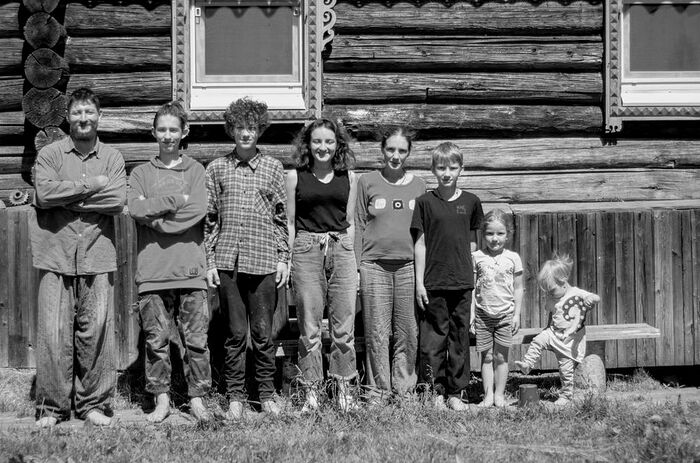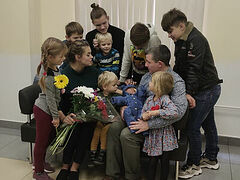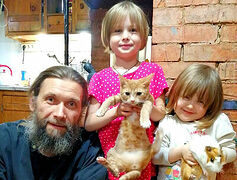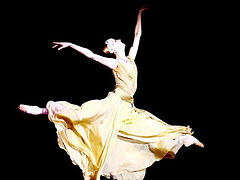This conversation began with the Smirnovs telling me about their moving from Moscow to Yaroslavl region, but suddenly we changed course to reflect on the true Russian culture and the absence of the same in Russia, and this topic turned out to be more captivating and profound than talking about a different life style.
Alexander (forty-seven years old) studied to be a physical edution teacher, but works as a metal artist and blacksmith. His spouse Anna (41 years old) is a philologist. They have seven children.
—Tell us how you decided to leave Moscow for a remote suburban area?
Anna: I grew up in the Moscow region, in a remote area in the forest. My parents and I lived near a small village. My mother was a teacher, my father was a jeweler. They worked in that village and had to walk about a mile to work, and I went there to school. We had hens, goats, dogs, and cats, so farming was not something unfamiliar to me. When I finished school I moved to Moscow, and there I met my future husband. He, in turn, was a native Moscovite.
Alexander: I was born and lived in Moscow, but when summer came I traveled to the Bryansk region (about 234 miles southwest of Moscow), where my grandparents lived in a village. In the fall I would come back to Moscow, but my mind would still be in that village. I would long all winter for the end of the academic year, for seeing my grandparents. Those years laid the foundation of my future life, as I had to clear weeds and fetch water from a well… That experience made me stronger because I had no wish to do anything. While other kids my age were riding their bikes, I had to pull up weeds—my grandpa would not allow me to go until I had finished with the weeds or fetched the water. Now I understand that those simple things formed my diligence; now I do not have to make myself do anything as I did when I was a child, and I have greater endurance.
Anna: While not yet married, we were sure that we’d eventually move to the countryside. A girl from a very distant village, I did my best to live in Moscow, and Moscow did not fall short of my expectations. I met wonderful people, I came to know God, I sang in a great folklore ensemble… I always had a feeling that I should savor enough of it and then come back home. I did not want to stay in Moscow forever.
Shortly after our wedding, we moved to my parents’ place and stayed there for two years. We bought a little house and planned to move into it, but soon understood that we really had no wish to live in the countryside. It was about isolation; we would not see our friends. But we were young, we realized that we would either get completely bored or would be constantly striving to leave. A life of isolation seems unbearable when you are young.
Alexander: Our friends lived in the Yaroslavl region, and now they are the godparents of our children. We made up our mind to go there, to join their community. But later we somehow changed our plans and found ourselves fifty miles away from their village, in the town of Myshkin on the river Volga.
—What did you plan to do after you moved?
Alexander: My father-in-law got acquainted with Vladimir Grechukhin, the founder of the town’s folk museum. When he learned I was a blacksmith, Vladimir suggested that I open a forge in the museum. I worked there for seven or eight years, but then I injured my arm and had to start making wooden toys. I made those toys myself, taught the kids how to do them, and gave master classes. Fifteen years ago, we launched a festival called The Family Circle. A group of like-minded people gathered around us piecemeal, they were mostly large Orthodox families.
Anna: I was pregnant with my second child when we moved to Myshkin. Anyway, I got a job in an art center for kids and later had to alternate maternity leave with working hours. When our third baby arrived, we came up with an idea of a new festival; we called it Apple Spas [Apple Feast of the Savior—the folk name for the feast of the Transfiguration].
The first festival was held for three days, with seventy participants. Then we thought it would be good to have similar festivals for families, so that entire families could come. We called it the festival of Russia’s traditional culture, The Family Circle—it was the first family festival in Russia. It was destined to become the work of our life. This year we were planning to celebrate its fifteenth anniversary, but the virus changed our plans.
 —What was your goal when you organized the festival?
—What was your goal when you organized the festival?
Anna: First of all, we had gotten bored and wanted to amuse ourselves. Secondly, we understood that our children should have social activities that would resonate with them, enable them to meet new people, people very close to us, or their peers who would also like the festival. The reason was that they found very few friends who shared their interests in the beautiful town of Myshkin. We though the town would be like home to us after our children were born, but we were wrong. We have a lot of friends, we are not outsiders, and our children have friends from among the local children; but I cannot say they have close friends. Why we did not make any close friends is beyond my understanding.
Alexander: We have good relations with the people we met in the museum, we continue to see one another. But they do not share our love for traditional culture. We invited them, trying to explain, “Guys, a band from Riga is coming to the town for just a few days. It’s something outstanding, unique! They are on their way to a different place, so they won’t stay long, so we asked them to give a concert for us. Please, come!” Such things happen once in ten years. This was a chance to meet people from Latgale who were fond of Russian culture. Some ten people attended the concert. The others had to do their housework or did not feel like coming.
Myshkin is not the only place such which such typical indifference. Russians from all parts of Russia alienate themselves from traditional culture. From their childhood, a very cliched understanding of Russia’s traditional culture had been imposed on them. That’s the root cause. And many can’t tolerate traditional culture as they know it. If a young person is fond of traditional culture, they often prefer the culture of indigenous peoples of the Americas. They make traditional shoes and clothes… When these indigenous peoples come to Russia, they say, “You know more about us than we do.” Russians wear Scottish kilts, play bagpipes, but do not recognize Russian culture as their native culture. This is because “Kalinka”1 has nothing in common with traditional Russian culture, Kalinka is a lie, and any human soul naturally rejects a lie. That is why people do not want to know Russian culture. But those who heard the songs of their grandmas, who saw folk costumes in Kursk or Smolensk regions know what is true and authentic. It resonates with our own children, and now they cannot imagine their lives without Russian songs and dances.
Culture sustains us. What culture do we have? We have recently raised this issue with the children; they asked, “That was a hundred years ago, why do we need it now?” We answer that we live with peoples that have their own traditions. They have fasts and feasts. Take Muslims, for example, they know everything about their feasts and celebrate them, grandfather goes to mosque, grandmother stays at home cooking dishes, then the entire family sits around the table, they perform traditional rituals, play traditional games… They have their own cultural code. And Russian people do not have one. We do not know the traditional songs and dances that gave people solace in the past.
—Is it possible to restore that cultural code?
Anna: Restoring our people’s cultural code is a dream. It would be possible only at the national level. But today we cannot even hope for it. For example, the Center for Russian Folklore is now closed in Moscow… It was a unique place, some twenty people worked there.
Alexander: A similar institution in Finland employs three hundred people. In Finland, each region has its own folklore center. We, in turn, store data in cartons on our expeditions to Russian regions.
Anna: This is an illustration of our State’s attitude towards Russian folklore—all our intangible heritage is in a tiny room, some five people work with it. We have no money for Russian folklore! This is the reason why, I believe, this issue can’t be resolved at the national level. The issue is being resolved daily by those who are committed to it. People do what they can, but I can’t say it is at least a drop in the ocean.
Living in Myshkin, raising children here, we realize that folklore has become their safety net. They have escaped adolescent and self-affirmation crises. We tested beautiful pedagogical methods; folklore helped me overcome my personal difficulties and it is highly effective with the kids. Our family goes around the entire circle of feasts, we bake traditional cookies, we observe the Church fasts and sing spiritual songs… Our kids do not know a different life, this life is a norm for them, and they seem very surprised when they learn there is a different life. There is nothing difficult, it would be great if everyone could live like this. Russia’s younger generation is fond of Halloween, but they have no idea that the night between January 13 and 14 has always been the day when young people scared one another—for the sake of amusement, of course. But if we start scaring people in January, everyone will think we are crazy.
—The voice of one is the voice of none. How do you preserve your zeal?
Anna: This town has dampened our enthusiasm a number of times. Then we realized it was predictable. Anyway, we have gone through terrible crises. We were ready to share our experience, share everything we know and can do for free, but the town remained uninterested. Before COVID-19, the local government included our festival in the list of cultural events. However, when the Minister of Culture gave me an award, the local authorities were notified about it but did not congratulate me.
Once our enthusiasm helped us get permission from the local government to open the House of Family Traditions. We were allocated the money from the town’s budget. We were in charge of renovating and decorating the house; it looked really nice, and we hoped to celebrate festivals there together with numerous families, and organize masterclasses. We began our work, but then the authorities deprived us of that house. And we decided we would never turn to the government for help, we will do everything on our own, we will not depend on anyone.
 Kind people lent us some money and we bought a plot of land in the suburbs. We would like to build a larger house there and move into it. At present, we set up summer camps literally in our backyard. The children can meet new, wonderful people. We have organized so-called adventure holidays for five years already. Families with children come for ten or fifteen days. We usually choose different themes. Take, for example, the theme called “Rus’”. We travel back to the eleventh century, to the times of Yaroslav the Wise, and Pechenegs attack us. Then was the time of the crusades, we lived during feudal wars. And this year we remembered the Mongol invasion. We have many games and training; the children practice historical martial arts and crafts. We prepare a script that we follow; the children do not know it. To sum up, they emotionally go through an entire era. It may seem like a game, but their emotions are real. The Orthodox faith is a natural part of those activities, we pray before and after meals, attend services, and everything is harmonious.
Kind people lent us some money and we bought a plot of land in the suburbs. We would like to build a larger house there and move into it. At present, we set up summer camps literally in our backyard. The children can meet new, wonderful people. We have organized so-called adventure holidays for five years already. Families with children come for ten or fifteen days. We usually choose different themes. Take, for example, the theme called “Rus’”. We travel back to the eleventh century, to the times of Yaroslav the Wise, and Pechenegs attack us. Then was the time of the crusades, we lived during feudal wars. And this year we remembered the Mongol invasion. We have many games and training; the children practice historical martial arts and crafts. We prepare a script that we follow; the children do not know it. To sum up, they emotionally go through an entire era. It may seem like a game, but their emotions are real. The Orthodox faith is a natural part of those activities, we pray before and after meals, attend services, and everything is harmonious.
Alexander: We also had a theme called Auto-moto-velo-photo. We taught the boys how to make repairs, to braze, to forge, to shave wood, and so we taught them how to do the things men do. Their teacher was our friend from the Night Wolves.2 They repaired bikes, changed tires, and built electric circuits. We ended the summer camp with a game where the kids had to use all the skills they had just acquired. Finally, our friend came with his late nineteenth-century camera, and the kids took photographs and then processed the film.
Anna: And we conceived a project that we called Creating With The Wise Bear. The Pronkin couple, who are animators, made a cartoon with the kids. It took them ten days. Later, Sima did paintings on the stove together with the kids, and Andrey put on a shadow play with them. We performed at a very high level. And the children do quite perfectly without their electronic gadgets. When the first group of kids came, we did not dare forbid them to use their gadgets, but we regretted that later. When the second group arrived, we said that there is no place here for electronic gadgets because we were in eleventh-century Rus'. The children did not even remember they had gadgets! Later, their parents would tell us that the kids at home were very silent and thoughtful and said, “Let me go back to Rus’!”.
A month later, we had a kapustnik (a cabbage party), and all the kids came. We chopped cabbage and danced. The children lacked folk dances and songs. They danced and sang for two days; we couldn’t stop them. The squeezebox played, and the children danced. They were about twelve to fifteen years old, both girls and boys. There were no clowns or actors. This is the reason why we do not give up—we see those children, we see their eyes. Traditional culture works miracles. It dawned on us that we in fact do nothing—the culture itself performs such wonderful things.
—You have seven children. How do you see their future?
Alexander: The eldest two have already grown up. Our first daughter, Seraphima, works as a preschool teacher. Our second son, Arseny, is now a student; he will specialize in wood carving. We hope our children will cooperate with us here, in this land. We would like to create a place for them where they will be able to achieve their dreams and earn their living. We want them to work, as teachers or as craftsmen, whatever they will choose, for the glory of the Russian people.









